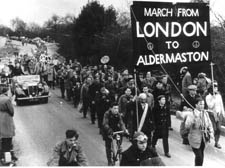|
|
 |
| |

A scene from March to Aldermaston, the short film that helped highlight the 1950s CND movement |
CND: or how Derrick learned to make movies and hate the bomb
Fifty years after the march to
Aldermaston put CND on the map, Dan Carrier meets the film-maker who recorded the iconic event
WHEN Richard Burton got the call he was busy working on John Osborne’s play Look Back In Anger.
It was 1958 and the Royal Court production was set to break new ground as part of the political wave of kitchen- sink theatre and writing that brought new voices to the fore.
The actor was asked to lend his distinctive voice as the narrator to a sombre documentary about the one burning issue that united a broad church of political groups – nuclear disarmament.
Now, 50 years after the ground-breaking Easter march to Aldermaston that put the Campaign for Nuclear Disarmament (CND) on the map, the film which followed the marchers four-day trek from Trafalgar Square to the air force base in Berkshire is being screened at the Renoir on Sunday.
Film-maker Derrick Knight was working for the committee that organised the protest – and helped produce the film.
Knight, then 27, lived above Book Lovers Corner in Pond Street, Hampstead – the former home of George Orwell.
Fresh out of Oxford and hoping to make his way running his own film production company, he admits that although Burton lent some gravitas to the documentary, the actor was not his first choice – he thought Albert Finney would be a better narrator.
He recalls: “Richard was working at the Royal Court at the time. He was known, but not as well known as he was to become. I admit I would have preferred Albert at the time, but Burton was superb.”
He had joined forces with film-maker Lindsay Anderson and the pair had already persuaded actors and technicians from the Royal Court to help the project. When they approached the star, Burton was happy to oblige.
“Lindsay just went up to him and persuaded Richard to do it,” Derrick recalls. “Richard showed up one day in a recording studio and read the script perfectly.”
The idea to create a documentary on the protest had come after discussing the issue with other film fanatics he had met at the Oxford University Film Society.
He said: “I fell in with two people interested in CND and we decided we’d go out and film the march.”
But the crucial thing was scavenging the necessary equipment needed and roping in enough volunteers with technical know-how to help out.
“It was all very ad hoc,” he says. “We had hardly any money. We had to shoot it on donated film stock and not a penny was spent.
“In the end, around 60 people volunteered their help. It was long before the days of portable cameras – one we borrowed from a film production company based in Kilburn was the size of a wardrobe and needed four people to carry it.”
While Richard Burton was the most high profile volunteer, the film was put together by the Film and Television Committee for Nuclear Disarmament – made up of volunteers. Lab technicians processed the film for free. Distribution company Contemporary Films made sure it was shown.
“Because we’d relied on volunteers who straight afterwards went back to their earning jobs, it took us some time to actually finish it,” Derrick recalls.
What struck him was the way Burton read the script. Written by the poet Christopher Logue, it offers now an insight into what made up the mass movement. His words attack all nuclear powers – East and West – showing the broadness of the anti-nuclear coalition.
And it also stands out as a reminder of the period: 1950s Britain comes alive through the trad jazz soundtrack and the carefully spoken comments of the marchers.
Derrick believes that the film captured the essence of a protest over the major political issue of the time.
He said: “This was a world where there were not so many other big issues. Today it is much harder. It was relatively easy back then to get the message across.”
• CND Anniversary Shorts is at the Renoir, Bloomsbury,
on Sunday April 13 at 10.30am |

|
 |
|
 |
|

